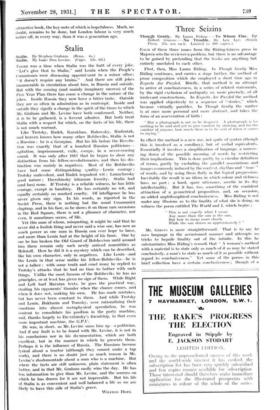Stalin
THERE was a time when Stalin was the butt of every joke. Let's give that to Stalin," said Lenin when the People's
Commissars were discussing appointment to a minor office; •• it doesn't require any brains." And there are still jokes innumerable in circulation about him, in Russia and outside. But with the coming (and mainly imaginary success) of the Five Year Plan there has come a change in the nature of the jokes. Inside Russia they now have a bitter taste. Outside they are as often in admiration as in contempt. Inside and outside they signify a change in the spirit of the times to which Mr. Graham and Mr. Levine have both conformed. Neither, it is to be gathered, is a fervent admirer. But both treat Stalin with a respect for which, on the facts of his life, there is not much warrant.
Like Trotsky, Radek, Karakhan, Rakovsky, Rudzutak, and heaven knows how many other Bolsheviks, Stalin is not a Russian : he is a Georgian. But his life before the Revolu- tion was exactly that of a hundred Russian politicians— agitation, imprisonment, exile, escape, in a never-ceasing round. It was only after 1917 that he began to show any distinction from his fellow-revolutionaries, and then his dis- tinction was mainly in negatives. Most of the Bolsheviks have had some distinguishing quality—Lenin courage ; Trotsky malevolent, and Radek impudent wit ; Lunacharsky good nature ; Dzerzhinsky inhuman ferocity. Stalin had (and has) none. If Trotsky is a reliable witness, he has little courage, except in banditry. He has certainly no wit, and equally certainly no marked cruelty. Of intelligence he has never given any sign. In his words, as reported in the Soviet Press, there is nothing but the usual Communist claptrap, and in his face, as he shows it on those rare occasions in the Red Square, there is not a glimmer of character, nor even, it sometimes seems, of life.
Yet this man of whom, misquoting, it might be said that he never did a foolish thing and never said a wise one, has now as much power as one man in Russia can ever hope to have, and more than• Lenin had at the height of his fame. One by one he has broken the Old Guard of Bolshevism until around him there remain only such newly arrived nonentities as Molotoff. How he did it is a mystery which can be described, like his own character, only in negatives. Like Lenin—and like Lenin in that sense unlike his fellow-Bolsheviks—he is not a talker : with some truth and cruel irony he replied to Trotsky's attacks that he had no time to bother with such things. Unlike the most famous of the Bolsheviks he has no principles, or at least has given no sign of them. While Right and Left hurl Marxian texts, he goes the practical way, stealing his opponents' thunder when the chance comes, and when it does not, making his own. He has made mistakes, but has never been constant to them. And while Trotsky and Lenin, Bukharin and Tomsky, were rationalizing their emotions into almost metaphysical speculation, he was content to consolidate his position in the party machine, and, thanks largely to Dznzhinsky's friendship, in that even more important machine, the G.P.U.
He was, in short, as Mr. Levine sums him up--a politician.
And if any fault is to be found with Mr. Levine, it is not in his conclusions nor in his dommentation, which are both excellent, but in the manner in which he presents them. Perhaps it is the influence of Russia. The Russians become lyrical about a tractor (although they cannot make a tap work), and there is no doubt just as much reason in Mr. Levine's rhodomontade about a man who is a machine. But where the facts are still unknown, plain statement is often better, and in that Mr. Graham easily wins the day. He has less information to give than Mr. Levine, and the sources on which he has drawn for it are not impeccable. But his life of Stalin is as convenient and well•balanced a life as we are likely to have this side of Stalin's grave.
WILFRID HOPE.






































 Previous page
Previous page